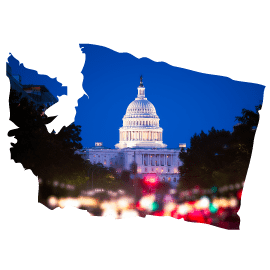Part Time Teaching Licenses: Washington
Expanding the Pool of Teachers Policy
Analysis of Washington's policies
Washington offers a Conditional Certificate license with minimal requirements, although it is unclear whether the license was designed to be used for part-time teaching.
The Conditional Certificate is only issued when no person with regular teacher certification is available. A candidate for a Conditional Certificate must be "highly qualified and experienced in the subject matter to be taught and has unusual distinction or exceptional talent demonstrated through public records of accomplishments and/or awards."
The state does not provide additional guidelines for obtaining a Conditional Certificate.
Recommendations for Washington
Offer a license that allows content experts to serve as part-time instructors.
It is unclear whether the Conditional Certificate serves as a vehicle for individuals with deep subject-area knowledge to teach a limited number of courses without fulfilling a complete set of certification requirements. It appears that this may be the intent of the license; however, state policy does not describe the conditions of employment, whether it is for part-time or full-time teaching or requirements that candidates must fulfill.
Require applicants to pass a subject-matter test.
Although this license is designed to enable distinguished individuals to teach, Washington should still require a subject-matter test. While documentation provided by the applicant may show evidence of expertise in a particular field, only a subject-matter test ensures that Conditional Certificate teachers know the specific content they will need to teach.
State response to our analysis
Washington asserted that NCTQ's analysis did not go far enough. In addition to the language quoted in the analysis, the state pointed out that the statute allows districts to hire candidates under this license as "circumstances warrant." Districts do use this provision for part-time teachers, including local musicians or artists. Washington further noted that it was used recently for TFA corps members in Seattle.
Select another topic
Delivering Well Prepared Teachers
- Admission into Preparation Programs
- Elementary Teacher Preparation
- Elementary Teacher Preparation in Reading Instruction
- Elementary Teacher Preparation in Mathematics
- Middle School Teacher Preparation
- Secondary Teacher Preparation
- Secondary Teacher Preparation in Science
- Secondary Teacher Preparation in Social Studies
- Special Education Teacher Preparation
- Assessing Professional Knowledge
- Student Teaching
- Teacher Preparation Program Accountability
Expanding the Pool of Teachers
Identifying Effective Teachers
- State Data Systems
- Evaluation of Effectiveness
- Frequency of Evaluations
- Tenure
- Licensure Advancement
- Equitable Distribution
Retaining Effective Teachers
Exiting Ineffective Teachers
Research rationale
For the importance of teachers' general academic ability, see R. Ferguson, "Paying for Public Education: New Evidence on How and Why Money Matters," Harvard Journal on Legislation 28 (1991), 465-498.
For more on math and science content knowledge, see D. Monk and J.R. King, "Subject Area Preparation of Secondary Mathematics and Science Teachers and Student Achievement," Economics of Education Review 12, no. 2 (1994), 125-145; R. Murnane, "Understanding the Sources of Teaching Competence: Choices, Skills, and the Limits of Training," Teachers College Record 84, no. 3 (1983)

